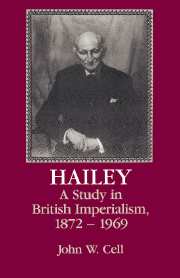Book contents
- Frontmatter
- Contents
- List of abbreviations
- Glossary of foreign words
- Preface
- 1 Early life
- 2 Colonization officer, 1901–1906
- 3 From Sargodha to Delhi, 1907–1912
- 4 Chief commissioner of Delhi, 1912–1918
- 5 A report on the Punjab
- 6 Finance member, 1919–1922
- 7 Home member, 1922–1924
- 8 Governor of the Punjab: the Sikhs, 1924–1925
- 9 Governor of the Punjab: the communal problem, 1924–1926
- 10 Governor of the Punjab: the communal problem, 1927–1928
- 11 Governor of the United Provinces, 1928–1930
- 12 Governor of the United Provinces: civil disobedience and Round Table Conference, 1930–1931
- 13 Governor of the United Provinces: 1931, year of crisis
- 14 Governor of the United Provinces: winding down, 1932–1934
- 15 Surveyor of Africa, 1935–1939
- 16 Two missions to Africa, 1939–1940
- 17 A report and a vision, 1941–1942
- 18 Adviser and propagandist, 1942–1945
- 19 Indian partition and the onset of African decolonization, 1945–1949
- 20 Defender of the faith, 1949–1969
- Bibliography
- Index
9 - Governor of the Punjab: the communal problem, 1924–1926
Published online by Cambridge University Press: 12 October 2009
- Frontmatter
- Contents
- List of abbreviations
- Glossary of foreign words
- Preface
- 1 Early life
- 2 Colonization officer, 1901–1906
- 3 From Sargodha to Delhi, 1907–1912
- 4 Chief commissioner of Delhi, 1912–1918
- 5 A report on the Punjab
- 6 Finance member, 1919–1922
- 7 Home member, 1922–1924
- 8 Governor of the Punjab: the Sikhs, 1924–1925
- 9 Governor of the Punjab: the communal problem, 1924–1926
- 10 Governor of the Punjab: the communal problem, 1927–1928
- 11 Governor of the United Provinces, 1928–1930
- 12 Governor of the United Provinces: civil disobedience and Round Table Conference, 1930–1931
- 13 Governor of the United Provinces: 1931, year of crisis
- 14 Governor of the United Provinces: winding down, 1932–1934
- 15 Surveyor of Africa, 1935–1939
- 16 Two missions to Africa, 1939–1940
- 17 A report and a vision, 1941–1942
- 18 Adviser and propagandist, 1942–1945
- 19 Indian partition and the onset of African decolonization, 1945–1949
- 20 Defender of the faith, 1949–1969
- Bibliography
- Index
Summary
“The new communal feeling is political,” Sir Malcolm Hailey wrote in July 1924, shortly after he took over the Punjab. The recent removal of the sultan of Turkey by the Atatürk revolution having deprived the Khilafat movement of its raison d'être, he explained, Indian Muslims were looking increasingly at their position in their own country. Some of them were declaring that Old Autocracy was preferable to New Democracy under Hindu domination. Hailey's perception that a largely middle-class, predominantly political, and essentially new political consciousness was maturing in the 1920s is worth emphasizing.
Communalism in twentieth-century India is probably best understood as a clash between fundamentally political ideologies devised for combat in a modern arena. As religions Islam and Hinduism – the first austerely and uncompromisingly monotheistic, the second including monotheistic, polytheistic, and pantheistic tendencies; the first a spear, the second an umbrella – were of course acutely different and perhaps ultimately incompatible. India's medieval history has been written both as a tale of enmity and a story of harmony – there were both. Not until the twentieth century, however, did the two religions become structurally antagonistic. Only then did separate communal electorates come into existence, for the purpose of electing explicitly communal representatives.
The categories of British India's electoral system were essentially artificial, assuming complete identity of interests among people who on any grounds other than religion – class, sectional, linguistic, caste – were in fact very disparate. Stereotyping encouraged communal consciousness.
- Type
- Chapter
- Information
- HaileyA Study in British Imperialism, 1872–1969, pp. 128 - 140Publisher: Cambridge University PressPrint publication year: 1992



